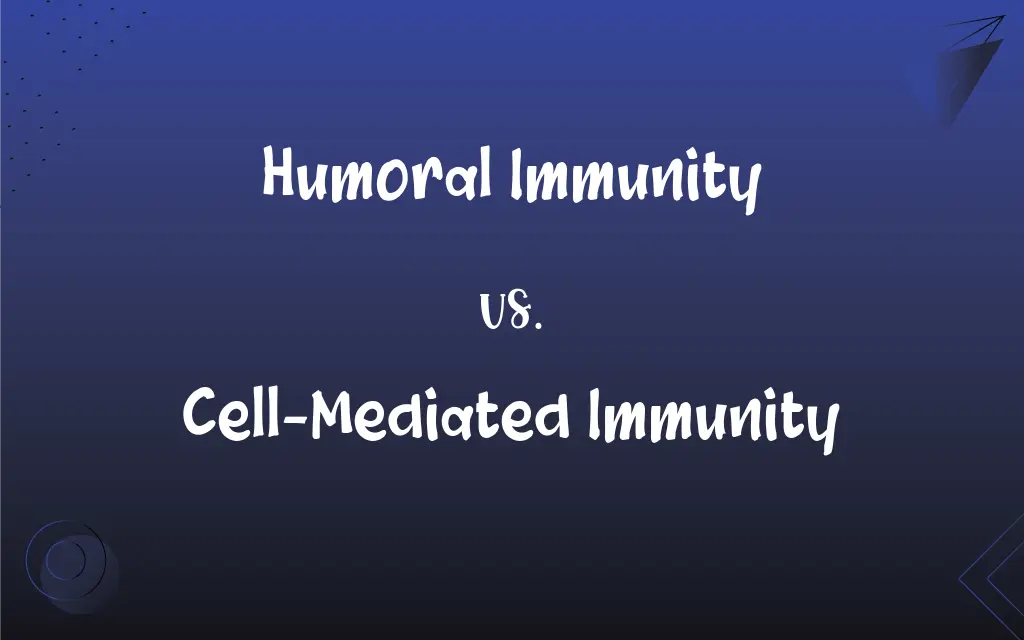Humoral Immunity vs. Cell-Mediated Immunity: What's the Difference?
Edited by Janet White || By Harlon Moss || Updated on October 27, 2023
Humoral immunity involves antibodies and B cells in body fluids, whereas cell-mediated immunity involves T cells and direct cell targeting.

Key Differences
Humoral immunity primarily functions through the production and utilization of antibodies. These antibodies are produced by B cells, which are a type of white blood cell. They circulate in body fluids, such as blood and lymph, and target pathogens like bacteria and viruses. On the other hand, cell-mediated immunity does not rely on antibodies. Instead, it involves T cells, another type of white blood cell. These cells directly engage and destroy infected cells or coordinate immune responses.
In the realm of humoral immunity, the antibodies recognize and bind to specific antigens on the surface of pathogens. This binding can neutralize the pathogen or mark it for destruction by other immune cells. In contrast, cell-mediated immunity involves T cells recognizing infected or abnormal cells. These T cells can directly kill the infected cells or release cytokines to recruit other immune cells to the site of infection.
Humoral immunity is particularly effective against extracellular pathogens like bacteria and viruses before they enter cells. The antibodies can neutralize these pathogens and prevent them from infecting cells. Cell-mediated immunity, however, is crucial for dealing with intracellular pathogens, such as viruses that have already entered cells, or cancerous cells. T cells can identify and destroy these compromised cells, preventing the spread of the infection or malignancy.
Both humoral immunity and cell-mediated immunity play vital roles in vaccine responses. Vaccines can stimulate the production of antibodies, thus enhancing humoral immunity. At the same time, they can also activate T cells, boosting cell-mediated immunity. This dual activation provides a comprehensive immune defense against the specific pathogens targeted by the vaccine.
Finally, both humoral immunity and cell-mediated immunity have memory components. Memory B cells in humoral immunity can quickly produce antibodies upon re-exposure to the same pathogen. Similarly, memory T cells in cell-mediated immunity can rapidly respond to previously encountered pathogens, providing a swift and potent immune response.
ADVERTISEMENT
Comparison Chart
Primary Cells Involved
B cells
T cells
Defense Mechanism
Production and use of antibodies
Direct cell targeting and destruction
Target Pathogens
Mainly extracellular pathogens
Mainly intracellular pathogens and abnormal cells
Immune Memory
Memory B cells produce antibodies quickly
Memory T cells respond rapidly
Role in Vaccination
Stimulates antibody production
Activates T cells
ADVERTISEMENT
Humoral Immunity and Cell-Mediated Immunity Definitions
Humoral Immunity
This immunity type encompasses the production of antibodies by plasma cells.
When exposed to a new antigen, humoral immunity responds by generating specific antibodies.
Cell-Mediated Immunity
Cell-mediated immunity involves T cells in direct defense against infected cells.
During a viral infection, cell-mediated immunity is essential for eliminating infected cells.
Humoral Immunity
Humoral immunity involves memory B cells for long-term pathogen recognition.
Thanks to humoral immunity, the body can quickly respond to pathogens it has previously encountered.
Cell-Mediated Immunity
Cell-mediated immunity includes helper and cytotoxic T cells for immune response.
Cytotoxic T cells, part of cell-mediated immunity, are vital for killing infected host cells.
Humoral Immunity
Humoral immunity targets extracellular pathogens through antibody action.
During a bacterial infection, humoral immunity is activated to combat the invaders.
Cell-Mediated Immunity
It's the immune response that doesn’t involve antibodies but relies on T cells.
Cell-mediated immunity plays a key role in combating intracellular pathogens like viruses.
Humoral Immunity
Humoral immunity is the aspect of immunity involving antibodies and B cells.
Vaccines often stimulate humoral immunity to provide protection against viruses.
Cell-Mediated Immunity
It involves memory T cells for rapid response upon re-exposure to pathogens.
The presence of memory T cells in cell-mediated immunity ensures a quicker response during a second infection.
Humoral Immunity
It’s the branch of the immune system that operates in body fluids.
Humoral immunity plays a crucial role in neutralizing toxins in the bloodstream.
Cell-Mediated Immunity
This immunity type is crucial for dealing with cells infected internally.
Cell-mediated immunity can identify and destroy cancerous cells in the body.
FAQs
Are T cells involved in humoral immunity?
No, T cells are primarily involved in cell-mediated immunity, not humoral immunity.
How do vaccines interact with humoral immunity?
Vaccines stimulate humoral immunity by prompting the production of specific antibodies against pathogens.
What is humoral immunity?
Humoral immunity is the part of the immune system involving antibodies and B cells that operate in body fluids.
What types of pathogens are targeted by humoral immunity?
Humoral immunity mainly targets extracellular pathogens like bacteria and viruses before they enter cells.
What is cell-mediated immunity?
Cell-mediated immunity is the immune response involving T cells that directly target and destroy infected or abnormal cells.
How does cell-mediated immunity respond to cancer cells?
Cell-mediated immunity can identify and destroy cancerous cells through the action of cytotoxic T cells.
Can cell-mediated immunity decline with age?
Yes, cell-mediated immunity can decline with age, leading to increased vulnerability to certain infections.
Are autoimmune diseases related to humoral immunity?
Autoimmune diseases can involve the production of autoantibodies, which is a dysfunction in humoral immunity.
Can humoral immunity neutralize toxins?
Yes, antibodies in humoral immunity can neutralize toxins present in body fluids.
Are antibodies involved in cell-mediated immunity?
No, cell-mediated immunity does not involve antibodies; it relies on T cells.
Can humoral immunity respond to intracellular pathogens?
Humoral immunity is less effective against intracellular pathogens; this is primarily the role of cell-mediated immunity.
Can cell-mediated immunity have a memory response?
Yes, memory T cells in cell-mediated immunity can rapidly respond to previously encountered pathogens.
What happens when humoral immunity is compromised?
A compromised humoral immunity can lead to increased susceptibility to infections, especially extracellular pathogens.
Can stress affect cell-mediated immunity?
Yes, chronic stress can negatively impact cell-mediated immunity, potentially reducing its effectiveness.
How does cell-mediated immunity protect against viruses?
It destroys cells infected by viruses, preventing the spread of the infection.
What role do helper T cells play in cell-mediated immunity?
Helper T cells coordinate the immune response and activate other immune cells in cell-mediated immunity.
Is humoral immunity involved in allergic reactions?
Yes, certain antibodies in humoral immunity can play a role in allergic reactions.
Do vaccines enhance cell-mediated immunity?
Yes, vaccines can activate T cells, thereby enhancing cell-mediated immunity.
What is the role of memory cells in humoral immunity?
Memory B cells in humoral immunity quickly produce antibodies during re-exposure to a known pathogen.
Do B cells play a role in cell-mediated immunity?
No, B cells are primarily associated with humoral immunity, not cell-mediated immunity.
About Author
Written by
Harlon MossHarlon is a seasoned quality moderator and accomplished content writer for Difference Wiki. An alumnus of the prestigious University of California, he earned his degree in Computer Science. Leveraging his academic background, Harlon brings a meticulous and informed perspective to his work, ensuring content accuracy and excellence.
Edited by
Janet WhiteJanet White has been an esteemed writer and blogger for Difference Wiki. Holding a Master's degree in Science and Medical Journalism from the prestigious Boston University, she has consistently demonstrated her expertise and passion for her field. When she's not immersed in her work, Janet relishes her time exercising, delving into a good book, and cherishing moments with friends and family.































































